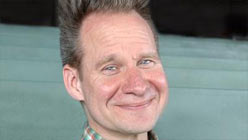The theater director and musical impresario Peter Sellars is on the phone from Southern California, and he says he’s in a “groovy” mood. Sellars is often in a groovy mood. It’s what makes him Peter Sellars, a person who relishes humor and strangeness in life, and in the works he brings to the stage, whether it’s John Adams’s Nixon in China or Shakespeare’s Othello. This day, though, Sellars’s mood quickly changes from groovy to grating because of one subject: The U.S. war in Afghanistan.
“We’re spending $121 billion per year in Afghanistan right now. It’s the longest war in our country’s history, and the most costly, without even talking about the human toll,” Sellars says. “And yet what trace of Afghan culture or presence is there in America?”
Sellars is bringing that culture to a wider audience by directing The Winds of Destiny, a work by composer George Crumb that Sellars has rejiggered, having it focus on both the U.S. Civil War and the military campaign in Afghanistan. The Winds of Destiny makes its Bay Area premiere this Thursday, June 16, 2011, after its worldwide premiere at the Ojai Music Festival in Southern California. Celebrated Afghan singers and musicians, including the Bay Area’s Ustad Farida Mahwash, are performing after each staging, giving audiences a two-for-one engagement. With Dawn Upshaw in the role of a U.S. veteran (Upshaw is musical director of this year’s Ojai festival), The Winds of Destiny is a tour de force that brings together some of the biggest names in stage and classical music.
Haunting and beautiful, The Winds of Destiny was initially created by Crumb in 2004. Both the original and reworked versions feature historic folk songs like “Oh Shenandoah” and such stalwart Civil War-era songs as “The Battle Hymn of the Republic,” and “When Johnny Comes Marching Home.” Crumb has turned these tunes into a bittersweet plea for normalcy in a time of chaos. The pathos and humanity of conflict are seared into the music, and Upshaw has said that, “The way George Crumb sets (‘When Johnny Comes Marching Home’) is very pained and angry.” Sellars has categorized Crumb’s songs as “strange and ghostly” and also “amazing.”


